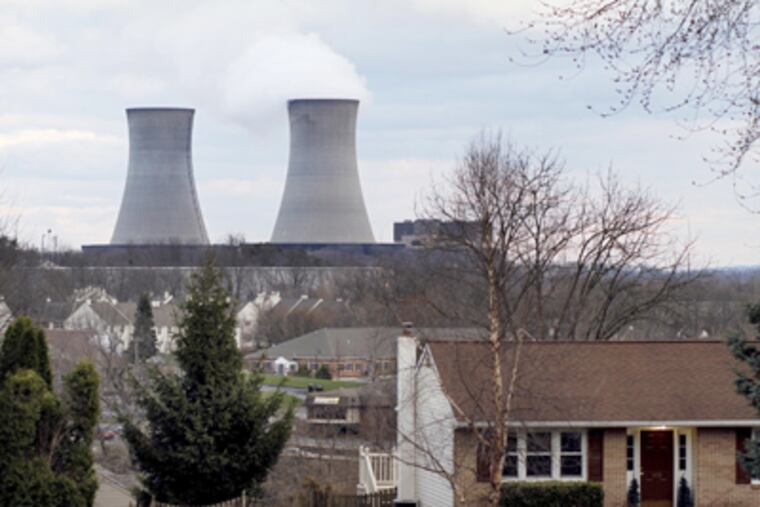Nuclear deregulation threatens workers at Pennsylvania plants and nationwide | Opinion
Workers at the Limerick nuclear plant and beyond are scared that new rules, supposedly meant to encourage social distancing, will instead cause harm.

Workers at nuclear power plants, just like everywhere else, are falling ill with the highly contagious Covid-19. Pennsylvania’s Susquehanna and Limerick power plants are among those that have so far identified infections among their staff, with incidences soaring at some plants.
One might hope that, at a time of such crisis, the nuclear power industry and its regulator would take every possible step to ensure the health and safety of nuclear workers and their families, as well as the surrounding communities where they live.
Unfortunately, the opposite is happening.
Instead, the U.S. Nuclear Regulatory Commission (NRC) is relaxing nuclear power plant safety inspections and maintenance while allowing essential staff, including control room operators, security forces and fire brigades, to work longer and exhausting shifts.
The extended permitted hours — up to 86-hour work weeks for two weeks straight — are justified, the NRC says, due to absenteeism, workers in quarantine, and Centers for Disease Control (CDC) guidelines for the Covid-19 pandemic, which recommend social distancing, necessitating fewer staff on site.
Yet at the same time, the NRC is allowing nuclear power plants to proceed with refueling operations, which can bring in as many as 1,800 workers from across the country.
While the nuclear industry was among those in the energy sector demanding priority testing for Covid-19, it is not clear whether testing for the coronavirus was conducted on workers before they arrived at the plants, given the scale of the outbreaks. More recent positive cases have been discovered through testing, with some tests conducted by workers’ personal physicians.
The Limerick nuclear power plant in Pennsylvania, which has now completed refueling, saw a level of overcrowding during refueling that alarmed workers. They described sitting “elbow to elbow” in canteens and computer labs, terrified that the coronavirus would rapidly spread among them. One told the Pottsdown Mercury he was “in a constant state of paranoia.”
» READ MORE: More Limerick nuclear plant workers test positive for coronavirus; refueling to continue
Such a “wildfire” spread of Infection became a reality at the Fermi 2 reactor in Michigan, which was forced to halt refueling. Close to 200 workers tested positive for Covid-19 at the Vogtle nuclear power plant in Georgia, where work has not been stopped, although the workforce has been cut back.
Asking workers to put in exhausting shifts not only weakens their immune systems, making them more susceptible to the coronavirus, but could also lead to fatigue-driven errors. Investigators found that sleep deprivation played a part in the March 1979 nuclear accident at the Three Mile Island reactor near Harrisburg.
“Skipping over essential safety checks could come at a high price.”
Compounding these risks is the request by reactor operators to postpone inspections of critical safety components, such as steam generators and reactor emergency core cooling systems, for an additional 18 months. The NRC is now allowing for these delays. But skipping over essential safety checks could come at a high price. Steam generators are critical to power operations and reactor safety. The reactors’ harsh operational environment places extreme stresses on the heat transfer component, causing tube degradation from vibration, heat, radiation, corrosion, and cracking that must be guarded against through routine inspection and maintenance.
Arguing for a reduction in nuclear power plant staff to avoid unnecessary contact might sound reasonable if it were not contradicted by the overcrowding brought on by the influx of large refueling crews. This suggests that the shared priority of the nuclear industry and its captured regulator is production, putting financial interests ahead of the wellbeing and safety of workers and surrounding communities. Mandatory testing of refueling crews and maintenance crews could prioritize both production and safety agendas.
Overextending exhausted workers could be also avoided by allowing reactors closed for refueling to delay restart and remain shuttered, especially given that electricity demand has fallen with most of the country in lockdown. Instead, those stay-at-home workers could supplement the crews at operating plants, ensuring worker safety and site security and reducing the likelihood of an accident due to exhaustion or human error.
» READ MORE: Ed Rendell: I wish I’d made different choices about nuclear power in Pa. | Opinion
The prospect of a serious nuclear power accident under the current pandemic conditions would set up an impossible choice for entire communities surrounding the affected reactor, already sheltering in place from the viral threat: whether to evacuate with potentially tens of thousands of others, or stay, instead risking radiation exposure. The disastrous flooding last week in Michigan, necessitating mass evacuations, has now given us a preview of this conundrum, without the added danger of radiation exposure.
Japan faced such a confluence of crises in March 2011, when the country was struck with an earthquake and tsunami, followed by widespread radiation contamination from the Fukushima nuclear meltdowns. This resulted in rescue attempts of some survivors of the tsunami and earthquake being abandoned due to the high levels of radioactivity in areas too contaminated for first responders to enter.
Now is not a time to increase the likelihood of a serious nuclear accident here at home. Instead, the NRC should be taking this opportunity to fulfill its stated mandate of “protecting the people and environment,” rather than bowing to the craven financial interests of the nuclear power industry.
Paul Gunter is Director of the Reactor Oversight Project at Beyond Nuclear, a national non-profit anti-nuclear watchdog organization based in Takoma Park, Maryland. Linda Pentz Gunter is Beyond Nuclear’s international specialist and edits and writes for its online magazine, Beyond Nuclear International.